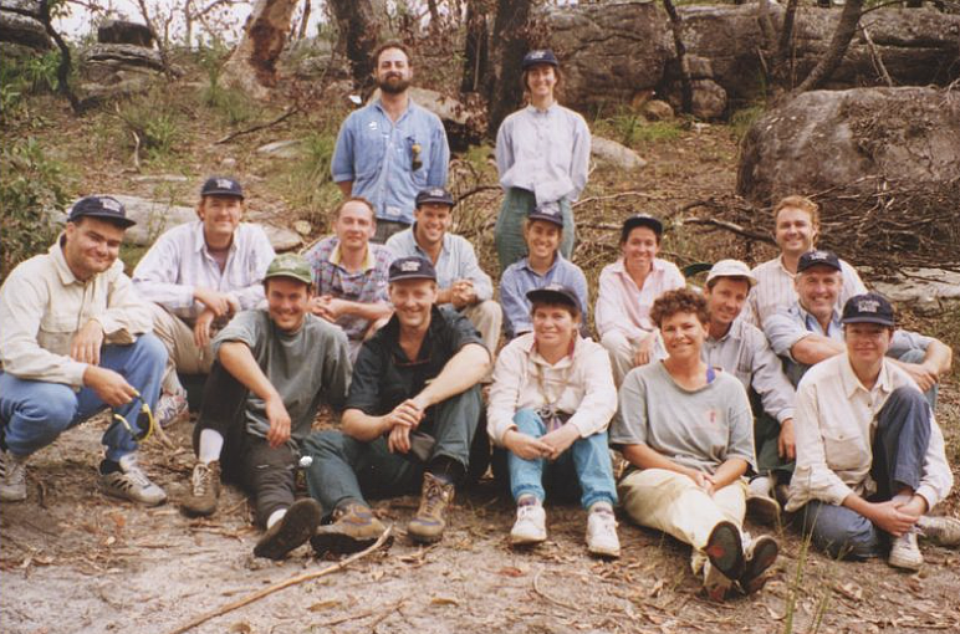
ICDA and BoardPro partnership unlocks digital governance tools for not-for-profits nationwide
Posted on 10 Dec 2025
Adele Stowe-Lindner, Executive Director, Community Directors The Institute of Community Directors…
Posted on 26 Mar 2025
By Greg Thom, journalist, Institute of Community Directors Australia

A new round of tax cuts was at the centre of the federal government’s strategy to use last night's Budget to bolster its election pitch to Australians by including measures designed to deliver cost-of-living pain relief.
Federal Treasurer Jim Chalmers described the Budget as the government’s “plan for a new generation of prosperity in a new world of uncertainty".
"We're delivering energy bill relief to every household, even cheaper medicines, historic investments in Medicare, higher wages and a fairer go for consumers," he said.
Some sector organisations were left disappointed, however, that the government did not go far enough to help disadvantaged and struggling Australians, save the environment and cater to people with disability.
Initiatives aimed at helping those doing it tough revealed in last night’s Budget included:
The reaction from sector organisations was mixed.
Australian Council of Social Services (ACOSS)
Community Council for Australia (CCA)
Australian Conservation Foundation (ACF)
People with Disability Australia (PWDA)
Older Peoples Action Network (OPAN)
Catholic Social Services Australia (CSSA)
Settlement Services International (SSI)
ACOSS CEO Cassandra Goldie said she expected an election Budget to be handed down by the Albanese government, but was nonetheless "astounded" the centrepiece was more dollars for everyone except those with the least.
“Only a year after the last tax cuts, the government is announcing a new set," she said.

Goldie said Australia required a budget and an election that set it up for the future, not a bidding war on more tax cuts.
“In the face of a serious cost-of-living crisis and overwhelming evidence to fix JobSeeker, to give $7 billion in tax cuts and do nothing to lift people out of poverty is simply shocking."
Goldie did welcome several Budget measures, including investments in health, public education and care services, which she said would help to restore years of cuts.
“The question for the next government is: how do you keep paying for these critical services upon which we all rely?"
Goldie called on all parties and candidates gearing up for the federal election to embrace an ambitious vision that leaves no one behind.
“People in Australia are yearning for more substantial reform. They’ve weathered difficult times and deserve a government willing to make bold investments in our shared future.”
Mission Australia CEO Sharon Callister said the Budget was another missed opportunity to provide relief to people facing immense financial pressures due to the ongoing housing emergency and cost-of-living crisis.
She accused the government of largely focusing on middle Australia in the Budget, while leaving behind those struggling the most.

“As we head into a federal election, we cannot waste another opportunity to act,” said Callister.
“If the Budget is the measure of what we value as a nation, then this one falls short in matching the ideal of the fair go for the many people across the country who feel left behind.”
Callister called on all political parties and candidates to commit to significant investment in social and affordable housing, homes for young people, homelessness prevention, and poverty alleviation measures.
This must include an increase to income support payments and Commonwealth Rent Assistance, she said.
“We acknowledge that the Housing Australia Future Fund and shared-equity scheme have been positive policies that offer some hope on the housing front, and we also welcome the government’s funding boost for the homelessness and housing peaks, supporting these organisations to continue their vital work to end homelessness in Australia,” said Callister.
However, she said the measures to date were not enough.
“This Budget missed the chance to increase the capacity of the Housing Australia Future Fund so it could more meaningfully start to meet the enormous and growing need for secure and affordable housing.
“Much greater ambition is required if we want to make housing truly affordable and end homelessness.”
Community Council for Australia CEO David Crosbie described the Budget as disappointing.
He said while the Budget included welcome funding boosts in important areas including health, education, and support for women, there are also some worrying reductions in areas such as the Department of Social Services.
"None of the core reform asks for our sector have attracted any new investment," said Crosbie.

"This government, like most before it, continues to take charities and community organisations for granted and has failed to invest in the essential role they play in community wellbeing and resilience."
Like many other sector leaders, Crosbie said the pre-election Budget was a missed opportunity to invest in some straightforward, low-cost measures that would make a real difference to charities and not-for-profits.
These included:
"This is unsustainable. As we go into the election period, we need all politicians to recognise and support the charities in their electorates by committing to real investment in improving the productivity, effectiveness and sustainable of charities and community organisations."
Anti-family-violence advocacy organisation No to Violence slammed the federal Budget.

No to Violence CEO Phillip Ripper said the Budget appeared to provide almost nothing new to tackle family violence.
“We are in the middle of a national family violence emergency,” he said.
“If the Commonwealth Government is serious about addressing this, it should have shown it tonight – but what we saw was previously announced commitments.”
Ripper said the document delivered by Treasurer Jim Chalmers was dubbed a "cost-of-living" Budget, but in reality ignored the cost of men’s family violence and the cost of women and children living in fear.
“That’s what tens of thousands of women and children are doing tonight.”
Anglicare Australia delivered a mixed report card on the federal Budget.
CEO Kasy Chambers welcomed measures designed to support the transition to a new aged care system and aged care reforms, including funding to meet requirements under the new Act and another round of pay increases for aged care workers.
“The Royal Commission handed down its recommendations in 2021, and older people have now been waiting for change for four years,” she said.

“Older people deserve access to quality care where and when they need it. This Budget locks in vital funding to continue reform and support the sector to transition to a new system from July.”
Chambers said that in trying to help people with living costs, however, the Budget missed the opportunity to target those who need it the most.
She said sector organisations had advocated in the run-up to the Budget for vital measures including an increase in Centrelink payments to above the poverty line, investing in job programs, and taking action to make housing more affordable.
“Yet this Budget has failed to take on these challenges or plan for the future. Instead, it offers short-term fixes, tax cuts and one-off payments including for those on higher incomes who don’t need or want them.”
Chambers said tax cuts and one-off payments did not help people out of poverty, and would do little to tackle rising costs, while other Budget measures, such as changes to the Help to Buy scheme, would help only small numbers of people instead of making housing more affordable for those who need it most.
“Instead of putting a band-aid over these problems, we need to invest in people who need it the most and fix them once and for all.”
Environmental advocacy organisation the Australian Conservation Foundation (ACF) labelled the federal Budget a fail for nature.

ACF CEO Kelly O’Shanassy said that despite Australia’s natural world facing the “double whammy” of climate change and an extinction crisis, less than one cent out of every dollar in the Budget was allocated to protecting nature.
“With rampant habitat destruction and the accelerating impacts of climate change, numerous ecosystems are on the brink and people’s livelihoods are at risk, yet investment in nature protection and climate action remains a tiny fraction of Commonwealth spending,” she said.
O’Shanassy said the Budget included some positive initiatives, including $250 million for the Saving Australia’s Bushland program and continued clean manufacturing and green metals.
However, O’Shanassy said there had been no new funding for:
“The government is spending six times more on fossil fuel subsidies than it is investing to protect our precious environment. This is a disgrace.”
Disability advocates said the federal Budget had left them feeling invisible.
“Yes, there’s funding under the NDIS and foundational supports but we’re missing from areas where the Disability Royal Commission identified change is most needed,” said People with Disability Australia (PWDA) board director Steph Travers.
“That is what happens when the reform roadmap from the Royal Commission is still missing in action.”
Travers said while safe, secure and affordable housing has been the focus of the Budget, the word "accessible" was missing.
“Housing isn’t safe or secure for people with disability unless it is accessible.
“We [people with disability] are at increased risk of homelessness and housing insecurity and yet we’re nowhere to be seen in these measures.”
PWDA also raised concerns that while the Budget included some positive measures for women overall, women and non-binary people with disability – who are more likely to experience family and domestic violence – are missing in action.

“We’re being treated as a ‘diversity footnote’ and not a targeted population with the funding to match,” said Travers.
“This is a big miss. If measures don’t name or focus on our community, they won’t work for us.”
PWDA deputy CEO Megan Spindler-Smith lamented that the same lack of prioritisation of people with disability in increased funding for disaster preparedness, responses and recovery would continue to put lives at risk.
“We know people with disability are more likely to be impacted during disasters, yet we continue to be left out of preparedness, response and recovery strategies,” she said.
“Prioritising our needs is not only good for us, but for emergency services, communities and responders too. Ensuring people with disability aren’t left behind is good for everyone.”
Spindler-Smith welcomed the $364 million in federal funding for foundational supports outside the NDIS that allow people with disability to live independently, but called for clarity on how the support would be locked in with states and territories in the long term.
“We can’t be left holding our breath every time a Budget is handed down, wondering whether these supports will be developed or still exist.”
Antipoverty Centre spokesperson and disability support pension recipient Kristin O'Connell described the government's economic blueprint as an irresponsible Budget that offered no relief to millions of people in poverty.
"This budget puts the nail in the coffin of Anthony Albanese's cruel, false promise to leave no one behind," she said.
"So-called energy bill relief does nothing to help when energy companies keep ratcheting up prices. The government needs to stop pretending to help poor people with more handouts for big business, landlords and corporate charities.
"For people on Centrelink payments life is harder now than it was three years ago, and this budget does nothing to change that."
OPAN CEO Craig Gear expressed concern that the federal Budget lacked adequate funding for the aged care sector.
While he acknowledged the $291 million the Budget allocated to continue to deliver the recommendations from the Royal Commission into Aged Care Quality and Safety, Gear said older Australians continued to wait too long for home care packages.
“Unsurprisingly, this Budget had a strong focus on easing the cost-of-living pressures facing Australian families in the lead-up to a federal election,” he said.
“Our aged care sector is facing many challenges right now, including significant workforce shortages and a growing number of older people waiting for support.
“OPAN would have liked to see increased access to hardship provisions for older people who have limited financial means, to make sure they don’t slip below the poverty line."
CSSA executive director Dr Jerry Nockles welcomed the government’s efforts to provide some relief in challenging economic times but said the Budget fell short in delivering the structural reform needed to lift people out of poverty and disadvantage.
"The Budget falls short of the strong leadership needed to truly serve the common good," he said.

Nockles said positive measures such as tax cuts, energy bill relief and the allocation of $644 million over four years to reduce the cost of prescription medicines listed on the PBS did not go far enough to address the systemic issues facing vulnerable Australians and reflected a piecemeal approach to policymaking.
"We had called for an increase in the rate of JobSeeker, Youth Allowance and related payments," said Nockles.
"The absence of significant movement on income support in the Budget is a missed opportunity to give millions of vulnerable Australians breathing space and demonstrates a failure to consider the broader implications of policy decisions on the entire community."
Nockles said that while Budget measures to improve accessibility to Medicare and reduce the cost of medications were a step in the right direction, they fell short in addressing the underlying issues of health inequality and affordability.
He called for a revised approach from government that challenged the prevailing trend of catering to sectional interests, which often resulted in fragmented policies that failed to serve the broader community.
"Australia's disadvantaged and marginalised are not a constituency to be farmed for votes," said Nockles.
"They are people with inherent dignity: people who demand respect and who deserve an entry point to a happy and fulfilling life.
"When those votes are bought on credit from future generations, we exacerbate the problem."
The CEO of Volunteering Australia, Mark Pearce, said this year's federal Budget had left volunteers behind.
He said volunteers were integral to addressing crucial national priorities such as aged care, disability, homelessness, community welfare, emergency services, the environment and climate, yet despite this, their important contributions to the fabric of Australian society had been overlooked.

“Now is a critical time to invest in the future of volunteering," said Pearce.
"The response to ex-Tropical Cyclone Alfred is just one recent example of how volunteers are essential to the resilience and recovery of Australian communities.”
However, Pearce said the Budget did not fund any new volunteering initiatives and provided no funding to implement the 10-year National Strategy for Volunteering.
"Without adequate support, the vital contributions of millions of volunteers to Australia’s resilience are at risk."
Pearce welcomed the continuation of the Volunteering and Community Connectedness funding stream, including the ongoing Volunteer Management Activity and Strong and Resilient Communities (SARC) grants, as well as
measures to address cost-of-living pressures.
However, he said organisations that relied heavily on volunteers remained under immense pressure with no support.
Pearce said there was also no funding in the Budget to bankroll reforms to the not-for-profit sector, such as those recommended in the Not-for-profit Sector Development Blueprint and the Productivity Commission Inquiry into Philanthropy.
“We cannot take Australia’s volunteers for granted," said Pearce.
"The work that volunteers do is not a ‘nice to have’; it is essential work that supports our schools and hospitals, our sporting teams, our aged care and disability services, and our ability to support the community in times of crisis.
"The foundations for a strong and sustainable volunteering ecosystem have been laid, guided by the co-designed National Strategy for Volunteering. Strategic investment in volunteering is crucial to safeguard its contribution to communities, and to ensure it is sustainable.”
Migrant and refugee advocacy organisation Settlement Services International praised the federal government's $178 million investment over five years to improve the nations' social cohesion.
Budget measures include funding for multicultural organisations to deliver tailored programs and services to the communities they serve along with address the recommendations of the Multicultural Framework Review.

SSI welcomed the $3.5 million over three years earmarked to help embed the Community Refugee Integration and Settlement program following the conclusion of a pilot and also acknowledged the extension of the Economic Pathways to Refugee Integration program designed to boost refugee employment.
However, SSI CEO Violet Roumeliotis said she was disappointed at the lack of action by the Government on urgent reforms to unlock the skills of 620,000 permanent migrants already in Australia amid one in three professions facing critical skills shortages.
“Since the launch of the Activate Australia’s Skills campaign, over 100 organisations and fourteen of Australia’s most influential leaders have called for urgent reforms to the skills and qualification recognition system” she said.
“Our campaign has provided costed, ready to go solutions for systemic reforms and place-based employment hubs to remove persistent barriers impacting refugees and migrants which could inject $9 billion annually into Australia’s economy.
"A piecemeal and sector-specific approach to skills shortages is not the most meaningful investment to unlock the skills of migrants.”
Roumeliotis said the Budget contained many positive initiatives, ranging from increased education and health funding to support for people with disability and cost-of-living relief.
“This Budget represents meaningful progress towards building stronger, cohesive communities across Australia, but we urge the government to act decisively on unlocking migrant skills, improving employment pathways, and progressing disability and early childhood education reforms in ways that ensure greater equity," she said.
"True social cohesion can only be achieved when every Australian – regardless of their background – has the opportunity and support to fully participate in our society and economy.”
Food relief charity OzHarvest slammed the Albanese government's federal Budget for failing to offer any support to Australians struggling with food insecurity.
This is despite an estimated one in six Australian adults and 1.2 million children living in food-insecure households and struggling to access enough nutritious food.
OzHarvest said the Budget included no increase in funding for the national food relief and food rescue sector, who collectively delivered over 160 million meals last year.
The charity did welcome the government's commitment of an additional $50 million to provide access to low‑cost groceries for indigenous Australians living in remote communities, and measures designed to ease the cost-of-living crisis, but said it wasn't enough.
"Disappointingly, there was no new funding for food waste reduction, despite the government’s commitment to halve food waste by 2030, and the issue costing the Australian economy over $36.6 billion annually," OzHarvest said in a statement.
"The lack of increase to JobSeeker payments (in the Budget) was especially disappointing, given over half of all low-income households (many on welfare payments) are experiencing food insecurity."

Posted on 10 Dec 2025
Adele Stowe-Lindner, Executive Director, Community Directors The Institute of Community Directors…

Posted on 10 Dec 2025
The Australia Institute has called on the federal government to force Australian businesses to be…

Posted on 10 Dec 2025
Economic empowerment is essential to enabling recovery, restoring agency and preventing future…
Posted on 10 Dec 2025
A long-time advocate for rough sleepers in northern New South Wales has been named her state’s…

Posted on 10 Dec 2025
What a year 2025 has been, particularly at a national level where the Parliament and politics as we…

Posted on 10 Dec 2025
Anyone working in an organisation knows it: meetings follow one after another at a frantic pace. On…

Posted on 10 Dec 2025
As a qualified yoga instructor who learned the practice in her hometown of Mumbai, Ruhee Meghani…

Posted on 10 Dec 2025
Community Directors trainer Jon Staley knows from first-hand experience the cost of ignoring…

Posted on 10 Dec 2025
Stressed, overwhelmed, exhausted… if you’re on a not-for-profit board and these words sound…

Posted on 10 Dec 2025
The Institute of Community Directors Australia trains over 22,000 people each year, which gives us…

Posted on 09 Dec 2025
The late Sir Vincent Fairfax is remembered as a business leader, a chairman of AMP, and an active…

Posted on 08 Dec 2025
A pioneering welfare effort that helps solo mums into self-employment, a First Nations-led impact…